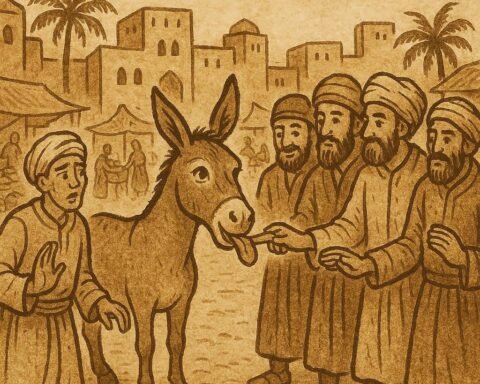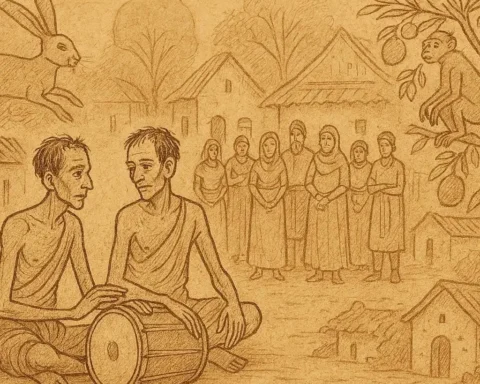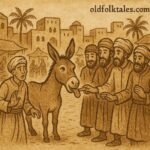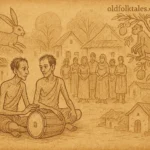Come closer, children of the Souss, and listen well. The wind that dances through the Anti Atlas carries not only dust and the cry of goats but also the stories of our ancestors. Among these is the tale of The Tree of Eternal Memory, a story that has been told in whispers and songs since the time when our people first laid stones for their homes and carved terraces into the mountains.
Long ago, in a small village hidden among the rocky slopes of the Anti Atlas, there lived a wise elder named Ayyad. His beard was as white as mountain snow, though snow rarely kissed those lands. He was known for his counsel, for every man and woman sought his advice when disputes arose. Yet, Ayyad carried a sorrow too deep for many to see. His only son, Yuba, had perished in a flood many seasons before. Though he had accepted fate, he feared that one day even the memory of his son would vanish like mist in the desert sun.
One evening, after the call of the shepherd’s flute echoed across the valley, Ayyad dreamt of a woman dressed in green, her eyes shining like fresh olive leaves. She said to him, “Seek the valley where the rocks hum when the wind passes. There you will find a sapling. Nurture it, and it shall become The Tree of Eternal Memory. With its roots, no loved one shall be forgotten.”
At dawn, Ayyad set out with his walking staff, following the paths only goats dared to tread. For three days he walked, guided by the sound of humming winds through narrow cliffs. On the fourth day, he discovered a valley where the stones indeed sang, vibrating with the voice of the air. There, among the rocks, a small sapling pushed through the soil. Its leaves shimmered faintly in the light.
Ayyad carried water in his goatskin bag to feed the sapling. Every day, he returned, speaking to it as though it were a child. “Grow strong, little one,” he would say. “Carry the names of those who came before us.” Seasons turned, and the sapling grew into a tree unlike any other in the Anti Atlas. Its trunk bore carvings of faces and names, though no hand had ever touched it. Villagers soon noticed, for when one spoke near the tree, their words were absorbed into the bark, and their memories seemed to remain forever within it.
People from nearby valleys began to arrive, bringing offerings of almonds and honey. They would whisper the names of their ancestors to the tree, and the bark would shift gently, as though acknowledging the spirits. Mothers brought the names of children who had died too young, and warriors brought the names of brothers lost in battle. The tree became a guardian of memory, a living archive of the Soussi people.
Yet, as in all stories, there was one who carried envy in his heart. A wealthy merchant named Tahar, who prided himself on being remembered through his riches, saw the reverence given to the tree and grew bitter. “Why should a tree hold more honor than me?” he spat. “When I die, my name should be enough!”
In his anger, Tahar plotted to cut the tree down. One moonless night, he crept into the valley with an axe. As he raised it to strike, the ground shook beneath his feet. From the branches of the tree came a sound like a thousand voices calling at once the names of ancestors, mothers, sons, and daughters. Tahar froze, for he could hear even his own mother’s voice among them, reminding him of the love she bore him. His hands trembled, and the axe fell to the earth.
Ashamed, Tahar dropped to his knees. “Forgive me,” he whispered. The bark shifted, and one final face appeared upon the trunk his mother’s, smiling as she had in life. From that day onward, Tahar devoted himself to protecting the tree, guarding it against harm.
The tree still stands, they say, hidden in a secret valley known only to those pure of heart. The wind that passes through its branches carries with it whispers of memory, reminding all who hear that no soul is ever lost as long as they are remembered.
Moral Lesson
The tale of The Tree of Eternal Memory teaches that true wealth lies not in riches but in remembrance. To be remembered with love is to live forever in the hearts of others. Memory is the soil in which legacy grows, and it must be nurtured with kindness, respect, and care.
Knowledge Check
1. What is the main theme of the Shilha folktale The Tree of Eternal Memory?
The main theme is the importance of memory and honoring ancestors as a way of preserving identity and legacy.
2. Where does the folktale The Tree of Eternal Memory originate?
It originates from the Shilha people of the Anti Atlas Mountains in Morocco.
3. What unique power did the Tree of Eternal Memory possess?
The tree could absorb names and voices, preserving the memory of ancestors and loved ones forever.
4. Who tried to destroy the Tree of Eternal Memory, and why?
A wealthy merchant named Tahar tried to cut it down because of jealousy and pride, but he was stopped by the voices of the ancestors.
5. What lesson does the folktale teach about wealth and legacy?
It teaches that true wealth is found in being remembered with love, not in material riches.
6. Why is oral tradition important in Shilha and Berber culture?
Oral tradition is vital because it preserves history, values, and cultural identity across generations, especially in communities without written records.






